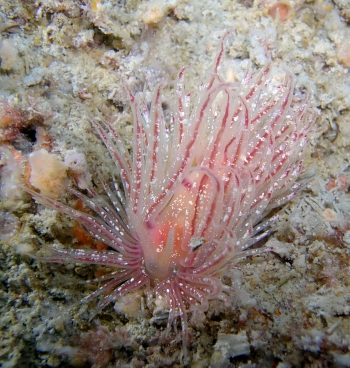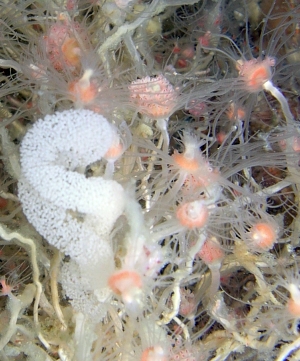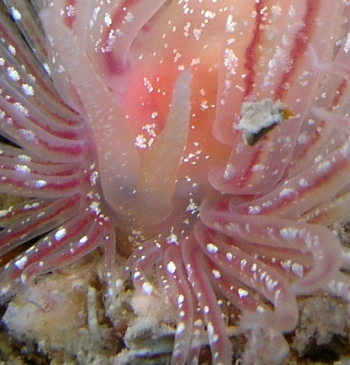Cumanotus beaumonti from Italy
May 10, 2006
From: Cristian Magnani

Dear Bill
Recently I was diving on a sunken oil rig out of Ravenna on the Italian Adriatic Coast when I found several Cumanotus beaumonti. It is the very first time I have seen them and I am sure it is the first season they breed here because i dive this spot on regular basis and never saw this slugs before. I send you a couple of pictures of the slug and its eggs.
Locality: Paguro wreck, 20, Italy, Adriatic Sea, 25 April 2006, On Hydroids. Length: 2,5 cm. Photographer: Cristian Magnani.
Best regards
Cristian
cristianmagnani@hotmail.com



Dear Cristian,
This is an interesting find. As you will see from earlier messages, there are some problems about the northeastern Atlantic species of this genus, Cumanotus beaumonti and Cumanotus cuenoti, both of which have been considered quite rare. As mentioned earlier, C. cuenoti is apparently smaller, not exceeding 10 mm in length, and lacks oral and propodial tentacles. It also has fewer denticles on the radular teeth. It feeds on Tubularia, and Ectopleura dumortieri while C. beaumonti is reported to feed on Corymorpha nutans, a solitary athecate hydroid. Your animal is certainly not feeding on a solitary hydroid, though it is athecate, and I would guess it is a species of Tubularia. Which brings me to Marina Poddubetskaia's photos [message #13507] of Cumanotus cuenoti in which she identifies the food hydroid as Ectopleura dumortieri. I am under the impression that E. dumortieri is a solitary hydroid, so it is likely that the hydroid in her photo is a species of Tubularia rather then Ectopleura. I don't know in the long run whether these food differences are really significant because all three names refer to closely related athecate hydroids all in the same family [Fam: Tubulariidae].
Which brings us back to anatomical differences. You wouldn't by chance have a photo of your Cumanotus showing its head more clearly would you? The only real difference I can find in the literature is that C. cuenoti is said to lack oral tentacles and tentacles at the corners of the anterior edge of the foot. As luck would have it, your photo doesn't show this area clearly.
In summary, I would agree that your animal is C. beaumonti. If so, we can then say that it feeds on Tubularia, just like C. cuenoti, which suggests to me we are one step closer to showing that C. cuenoti is just a juvenile of C. beaumonti.
Best wishes,
Bill Rudman
Related messages
-
Cumanotus beaumonti feeds on Tubularia
From: Dominique Horst, April 21, 2010 -
Cumanotus beaumonti burrowing and swimming
From: Dominique Horst, April 20, 2010 -
Cumanotus beaumonti - reproduction
From: Dominique Horst, April 20, 2010 -
Cumanotus beaumonti feeding
From: Dominique HORST, April 20, 2010 -
Cumanotus beaumonti from the French Mediteranean
From: Dominique Horst, April 20, 2010 -
Re: Cumanotus from Slovenia [2]
From: Sandrine Bielecki, February 25, 2009 -
Re: Cumanotus beaumonti and C. cuenoti
From: Cristian Magnani, May 13, 2006 -
Cumanotus beaumonti swimming
From: Cristian Magnani, May 11, 2006 -
Re: Cumanotus beaumonti from Italy
From: Cristian Magnani, May 11, 2006 -
Re: Cumanotus beaumonti from Italy
From: Philip Cromwell, May 10, 2006 -
Cumanotus from Slovenia [2]
From: Tom Turk, April 13, 2005 -
Re: Cumanotus from Slovenia
From: Tom Turk, April 12, 2005 -
Cumanotus from Slovenia
From: Tom Turk, April 11, 2005
